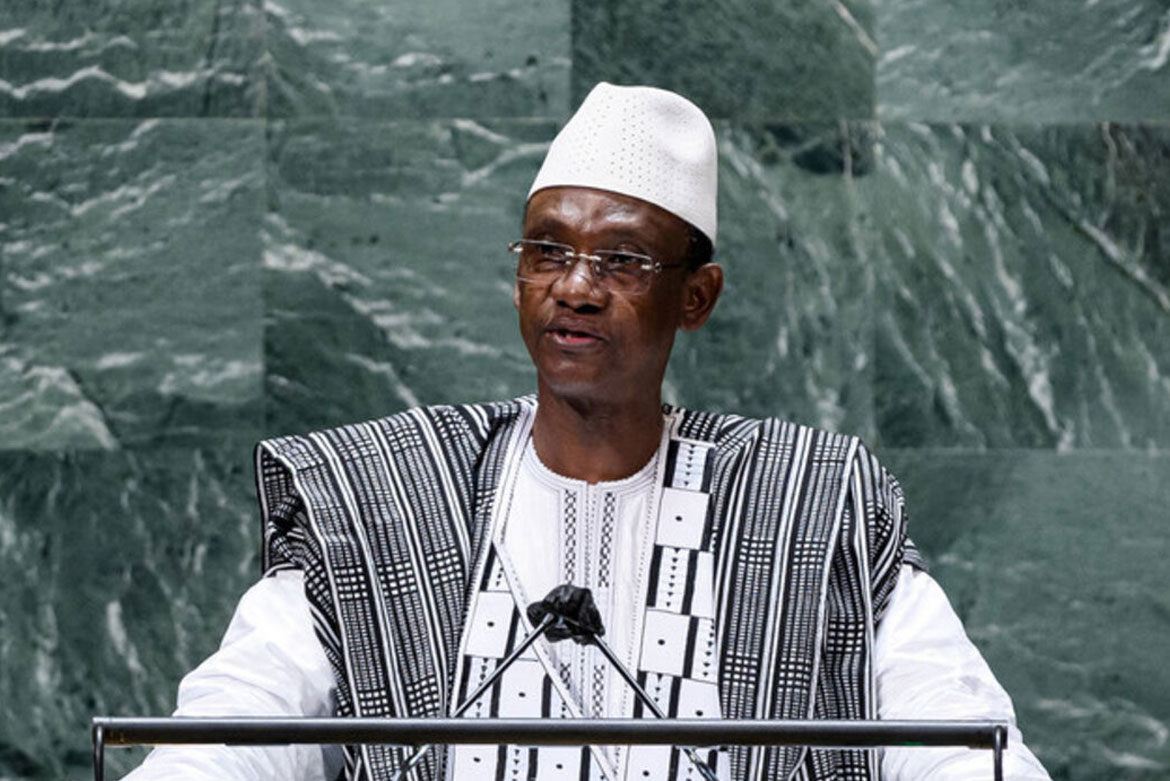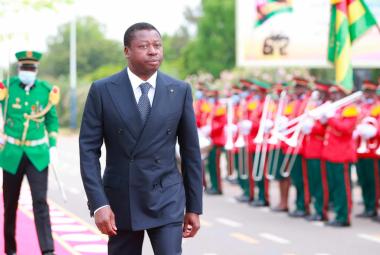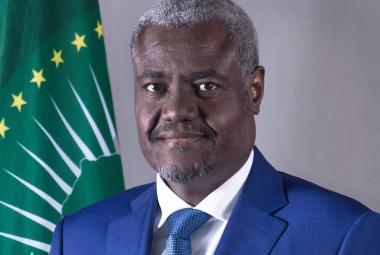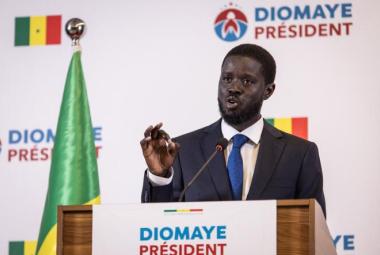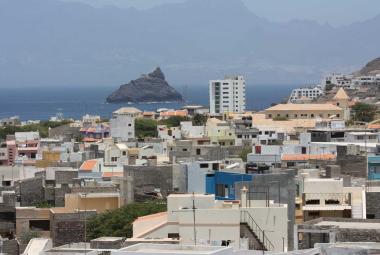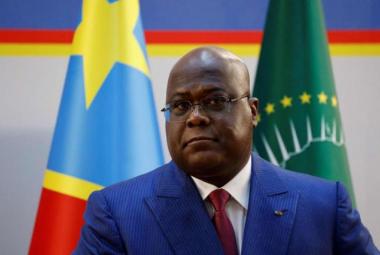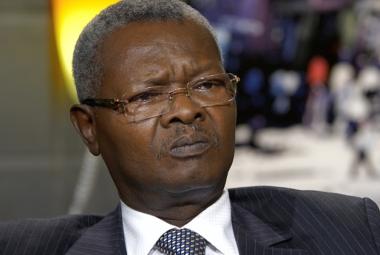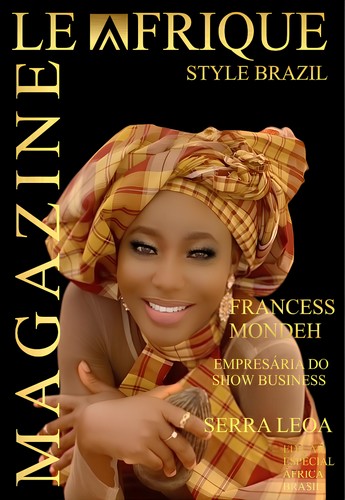Member of the National Union of Youth of Mali, a movement of young people close to General Moussa Traoré, the dictator who massacred hundreds of young Malians in the early 1990s, Choguel Kokalla Maïga does not hide it. Nor does he hide his inclination for Russia where he did his university studies in the face of the new geopolitical challenges that Africa must now face.
In the early 1990s, several movements, namely the Alliance for Democracy in Mali (ADEMA), the National Committee for Democratic Initiatives (CNID), the Association of Pupils and Students of Mali (AEEM), the he Association of Graduates Initiators and Job Seekers (ADIDE) marched in the streets of Bamako and several towns in the country to demand multipartyism and democracy. On this occasion, one could read in one of ADEMA's documents: "diverse in its opinions and beliefs, multiple in its political and ideological inspirations, but unified in its demands for public and individual freedoms, the current movement proclaims the virtues of pluralist democracy and calls for the establishment of a multiparty system in Mali". Without trying to start a dialogue, the regime of General Moussa Traoré takes out armored vehicles against the demonstrators. Opposition activists and sympathizers then attacked state stores as well as the properties of barons and relatives of the wife of the President of the Republic, the very influential Mariam Traoré.
The demonstrations of March 22, 23 and 24, to which the army responded by shooting demonstrators on sight, constitute unprecedented events in the history of all of West Africa. On March 22 alone, more than a hundred people were killed. On March 24, the Africans of France sign a petition against this human butchery. Thus, they write in an “African Manifesto for Mali”: “Africans residing in Europe, coming from all the horizons of our continent, united in the diversity of our cultures, we wish to express in the most vigorous way our horror but also our shame at such deliberate, unprecedented infamy.”
The whole of Africa remembers the conditions under which the dictator Moussa Traoré was overthrown. By a coup then carried out under the leadership of Colonel Amadou Toumani Touré, known as ATT. Following the marches and strikes in favor of democracy launched by the National Union of Workers of Mali (UNTM) and many other associative movements that began in December 1990, the regime ended up falling. At that time, the current Prime Minister of the Transition in Mali, Choguel Maïga, was already alongside General Moussa Traoré and his Democratic Union of the Malian People (UDPM), the ruling party, as a member of the youth of the left.
With his real name Chouaïbou Issoufi Souleymane, Dr. Choguel Kokalla Maïga was born in 1958 in Tabango in the Circle of Ansongo and in the Gao Region in northern Mali. He is described as having always been a brilliant student in his time. He began his studies from 1963 to 1974, respectively attending the basic schools of Tabango and Bara (Circle of Ansongo) as a brilliant student. And from 1974 to 1977, he joined the Lycée Technique de Bamako, in the capital of the country. He graduated top of his promotion in the “Technical and Industrial Mathematics (MTI)” series. In the years following the independence of 1960 in French-speaking Africa, most African countries ruled by soldiers are rather close to the former Union of Soviet Socialist Republics (USSR). This is how he finds himself among those that these different countries send as scholarship holders to the country of Lenin. He is one of the most promising in his country. With a technical baccalaureate, he continued his studies from 1977 to 1988 at the State University of Belarus and at the Moscow Institute of Telecommunications in the former USSR. He first obtained the diploma of Telecommunications Engineer, with the mention "Excellent" and the "Congratulations" of the jury. At the end of the 1980s, when he returned to Mali, he holds a degree in Telecommunications Engineering. But in 1987, he did a State Doctorate thesis in Telecommunications as part of his postgraduate studies.
We are still at the time, in most countries formerly colonies of France, in single party systems. He joined the movement in power of Moussa Traoré who ruled the country from 1968-1991. Until he is deposed by Colonel Amadou Toumani Touré alias ATT. And the Transition that will follow will see the coronation as President of the Republic of Professor Alpha Oumar Konaré (1992-2002). In 2002, with the advent of President Amadou Toumani Touré, known as ATT, who returned to power this time through the ballot box, Choguel Maïga was still at his side. And he becomes his Minister of Industry and Commerce. When he was overthrown by Captain Amadou Haya Sanogo's coup in 2012, the same Choguel Maïga will reposition himself following the Transition led by interim President Diouncounda Traoré (2012-2013). He then joined in 2015 Ibrahim Boubacar Keïta (IBK) who was democratically elected President of Mali after the interlude of the putschists and the Transition led by the interim President. He becomes the Minister of Digital Economy, Information and Communication of President IBK. When the latter fell, he joined the Mouvement du 5-June/Rassemblement des forces patriotiques (M5-RFP), a motley coalition of political opponents, religious leaders and members of civil society. Which ended up being right of the regime of President Ibrahim Boubacar Keïta. As it led Colonel Asimi Goita, with some of his brothers in arms, to overthrow the said regime on August 18, 2020.
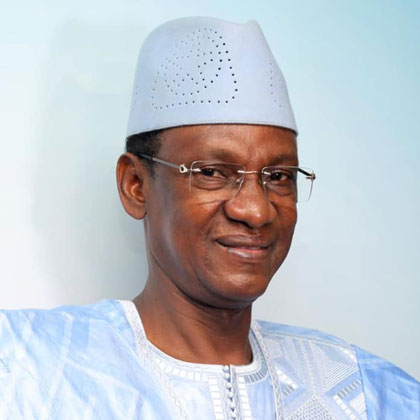
de la Transition au Mali
Choguel Kokalla Maïga is therefore not an unknown name to Malians. Far from it. He is the president of the Patriotic Movement for Renewal (MPR). Considered a great opportunist or an all-round eater by some and a great political tactician by others, he was a candidate in the presidential elections of 2002, 2013 and 2018. But in each election if his score has not never come close to 4% of the electorate, the man who is described as a political animal always knows how to land on his feet, so to speak.
Commonly known as Choguel, his official biography reads: “Coming from a family that has been involved in politics for several generations. Indeed, the tarikh of this family, piously preserved and regularly updated as well as the living testimonies attest that he descends from the founder of the Songhoi empire, Soni Ali Ber and that he belongs to the sixteenth generation descending from this exceptional man state. From the 15th century to this day, his family has constantly played a major role in all phases of the political history of the Malian people. This is how the resistance against colonial penetration created very strong special links between Firhoun, the amenokal of the Tuareg Oulliminden and Hamida Lély, one of his ancestors and founder of Tabango, his native village. These bonds woven in the ordeal are, still today, maintained by the families of the descendants of the two men who consider themselves blood brothers. During the national liberation struggle waged by the political parties in the forties of the last century, the members of his family, from Tabango to Gao, passing through Tacharane, Gargouna and Bara, actively militated, who in the PSP who in the US-RDA”.
It is not only with the advent to power of the Colonels in Mali led by Colonel Assimi Goïta that "Choguel" is illustrated on the national scene but well before. Because, whether we like it or not, "Choguel" has political experience and the verb always sliced. Especially when he has goals. Even if it means pulling too hard on populism's rope to achieve its objectives. As when as Prime Minister of the Transition the resurgence of his Russian-speaking inclination and in particular for the benefit of Wagner's mercenaries makes him pour out diatribes with regard to France. At the podium of the United Nations General Assembly, on Saturday September 25, 2021, Prime Minister Choguel Maïga bluntly accused France of having abandoned Mali by declaring: "The new situation born of the end of Barkhane placing the Mali faced with a fait accompli and exposing it to a kind of abandonment in full flight, leads us to explore the ways and means to better ensure security independently with other partners so as to fill the void that will not fail to create the closure of certain rights-of-way of Barkhane in the North of Mali".
Faced with the procrastination of the military junta in power in Bamako to observe the necessary political changes and to propose a reasonable timetable for a return to normal constitutional order in Mali, the Prime Minister and the supporters of Colonel Assimi Goïta who chairs the Transition have the propensity not to respect the injunctions of the Economic Community of West African States (ECOWAS). Even if it means pouring into the sovereignist and pan-Africanist one-upmanship. At the cost of many economies of truths or half-truths.
And Madiambal Diagne, Senegalese journalist and columnist wrote in an article entitled "What Macky Sall did for Assimi Goïta 'The bombs will not fall on Bamako...': "The fact remains that this is the place to wonder what is the consistency of accusing ECOWAS, led by Nana Akufo Addo (Ghana), of being in the pay of France, when we know that Ghana and Nigeria had all the "merits" for having been the standard bearers of a refusal of an alleged French domination in West Africa, through the CFA franc or the Eco? What respect do we express to ourselves and to Africa when we would consider that Nigeria, Ghana, Cape Verde, Sierra Leone, Liberia, Gambia, Guinea-Bissau, would all be " sheep of Paris”, as would already be the former French colonies (Senegal, Ivory Coast, Niger, Burkina Faso, Benin and Togo)?
Besides, anti-imperialism for anti-imperialism, what is the logic of declaring to refuse a certain influence from France and accept another influence, that of Russia? If ECOWAS was acting under the influence of a foreign power, it has become clear that the regime of the Malian putschists is following the roadmap set by Moscow. Russia has taken up residence in Bamako and Assimi Goïta is acting under the dictation of Ambassador Igor Gromyko, who has finished taking his ease. Reluctantly, the ECOWAS authorities have tried everything with the junta to avoid getting into the situation of having to strengthen the sanctions against Mali. The former Nigerian President, Goodluck Jonathan, was sent several times to the junta, and many other parallel contacts were made with the military in Bamako”.
In Mali, the call for Wagner's Russian mercenaries was ultimately driven by nothing other than a strategy by the leaders of the Transition to want to stay in power and last. And that is only possible by turning away from France under the fallacious pretext of its collusion with the Jihadists or the Tuareg rebels and tutti quanti... There is something illogical, not to say grotesque to talk about Pan-Africanism and Sovereignty by asking France to leave its territory for reasons of sovereignty, while inviting another foreign power to settle there. By sounding this trumpet to a public opinion largely fueled by “Fake News” from social networks and manipulations. The supporters of the military junta in power can always gloss or spread their logorrhea bristling with acerbic and thoughtless criticism against France, even pure and simple hatred, had it not been for its intervention in extremis all the current leaders of Mali would either be on the run or under the Sharia of the Islamic Police of terrorist groups.
Choguel Maïga, the Prime Minister of the Transition led by President Assimi Goïta after his double coup in Mali, studied engineering at the Moscow Institute of Telecommunications. This is no secret but perhaps also says a lot about his attachment to Wagner and Russia. But this former close friend of General Moussa Traoré who was deposed in 1991 and who never ceases to condemn France is, as Tiébilé Dramé would say, the president of the Party for National Rebirth (PARENA), a “supporter of dictatorship”. We are tempted to believe that his rapprochement or alliance with Russia is part of the great political tactic with which he is credited and that with the sole aim of guaranteeing life insurance to the current regime beyond the Transition. And this underlying reality cannot therefore be concealed, after all.
By Abdul Yazid



